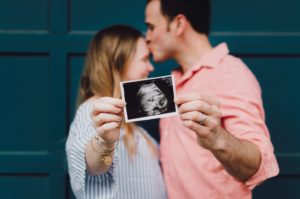
You Are What You Eat…and So Are Your Babies
“Give her an extra slice of cake. She’s eating for two!”
“I wish I was pregnant so I could eat anything I wanted with no judgement!”
“Eat everything now, girl! You’ll lose all the extra weight when you breastfeed anyway!”
Comments like this are rife during pregnancy…There’s the well-meaning ‘cake pushers’, the slightly envious, middle-aged women who remember their ‘pregnancy figures’ with rose-coloured glasses, and there’s also just a heck-of-a-lot of misinformation about diet, pregnancy, and the significance it all has for the health of your baby!
Does Your Diet in Pregnancy Matter?
As it turns out, it DOES matter what you eat during pregnancy! In fact, your diet during, and leading up to, pregnancy has the ability to influence how your future baby’s genes are expressed (1)! This is known as ‘epigenetics’, which describes the fact that certain environmental factors during pregnancy, such as diet, can switch the baby’s genes ‘on’ or ‘off’, impacting their future disease risk (1).
Take, for example, obesity. We know that obesity tends to be passed on from generation to generation, but the reasons behind this are only recently become clearer…It has to do with your gut…not the type of ‘gut’ you might expect, but the ‘gut’ inside you, including your intestines and stomach…where you house trillions of tiny microbes that help, or hinder, your health, and the health of your baby (1).
It’s complicated, and there are some things that even the brainiest of scientists don’t understand yet, but what we do know is that the mum’s diet during pregnancy influences the mum’s gut microbiome, which influences the baby’s microbiome while in utero and after birth, which influences the way in which that baby’s genes are ‘expressed’… that is, whether the gene they have for, say, obesity, will be switched ‘on’ or ‘off’ (1).
Fat and the Gut
There’s been some research into the impact that ‘high fat diets’ have on a pregnant woman’s microbiome and the baby’s future health (2).
In this case ’high fat’ refers to diets high in poor quality, saturated fats, like those in fast food and ultra-processed cakes, not the ‘good fats’, like avocado, nuts, seeds, and olive oil! High fat diets tend to decrease the diversity of microbes in the gut, and this can lead to chronic inflammation and ‘leaky gut’, where the tight junctions in the intestine become disturbed, allowing pro-inflammatory bacteria into the blood circulation, and creating body-wide, low-grade inflammation (2).
High fat diets also encourage the growth of less beneficial bacteria, which can trigger autoimmune disease and gut issues (2). If this type of high fat diet is consumed during pregnancy, it alters the mum’s microbiome, and these imbalances may be passed on to the baby prior to, and during, their birth (2).
These alterations to the mum’s microbiome have been shown to impact bub’s development whilst in the uterus, sometimes even leading to impaired brain function, and may also have a long-lasting influence on other aspects of the baby’s future health, such as negatively affecting their metabolism (1, 2).
Obesity Microbiome and Diet
The gut microbiome composition in obese people is different to those of a healthy weight (1). To be more specific, obese people generally have less diversity overall, and a higher Firmicutes: Bacteroides ratio (1).
Obesity is an extremely complex and multifactorial issue, and losing weight is not always possible for everybody, however, the microbiome offers an compelling modifiable factor that could potentially help to prevent obesity in future generations, with some manipulation via diet and lifestyle throughout pregnancy (1).
Specific diets that have been shown to positively impact the ‘epigenetic switches’ during pregnancy to help prevent obesity in the baby’s future include things like folate-rich leafy greens, soybean, green tea polyphenols, and broccoli sprouts (1).
Obese people thinking of having a baby may choose to learn more about these ‘epigenetic’ diets to help optimise their microbiome and give their baby the best chance of a healthy life (1).
Probiotics?
There is also some promising research showing that taking a probiotic supplement during pregnancy may be able to help with any imbalances in the mum’s gut microbiome. This, in turn, could help to alleviate some of the potential health concerns passed on to the baby (2).
I’m thinking of having a baby…What do I need to do?
Aside from considering a probiotic, your best bet is to nurture your gut microbiome with a healthy diet, from the minute that you even start to think about having a baby! A diet rich in vegetables, fruits, nuts, seeds, legumes, olive oil, whole grains and seafood has, on countless occasions, been shown to be an excellent method of optimising your gut, at any stage of life (3)!
References


This website and the information it contains is not intended as a substitute for professional consultation with a qualified practitioner.
© MothersBabies Ltd. View our Terms of Use & Privacy Policy
Search MothersBabies
Looking for something in particular? Find it here using our search query function. Simply type in your keyword and click the icon.
Recent Articles






Join Us